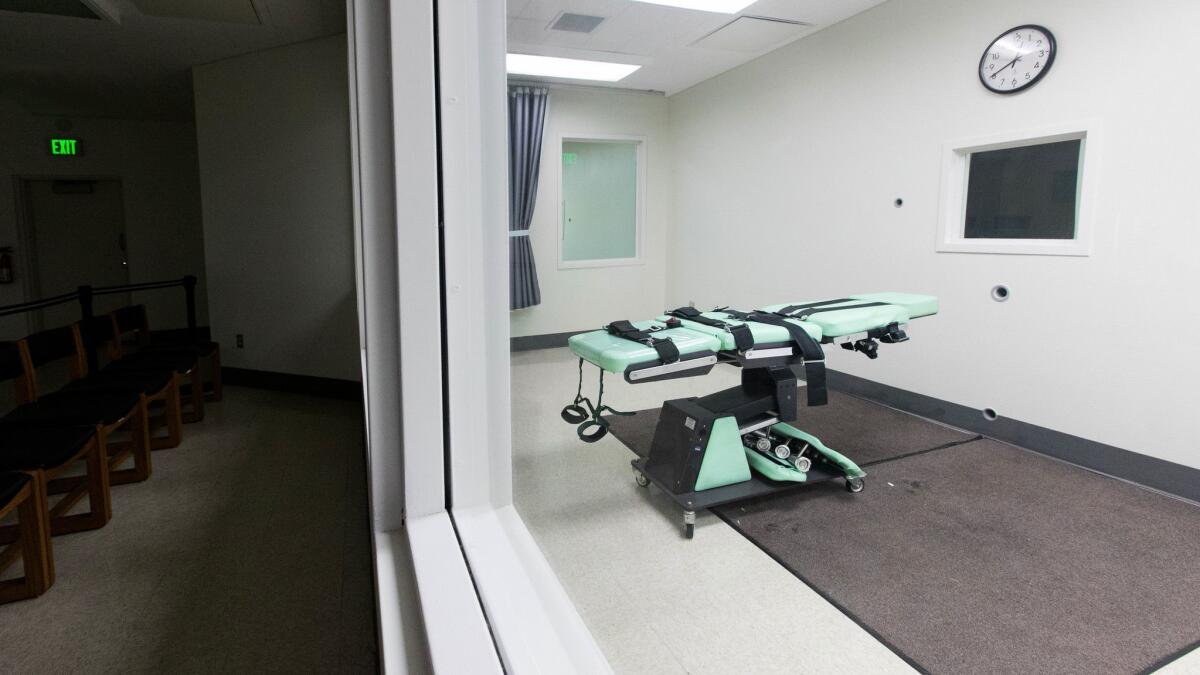Editorial: The death penalty is wrong, but it’s still the law in California

- Share via
In his laudable zeal to undo California’s dysfunctional capital punishment system, Gov. Gavin Newsom may be taking things a step too far. He told reporters Thursday that he is contemplating a ban on county district attorneys seeking the death penalty in capital-eligible cases. As great as it would be for the Supreme Court to finally rule the barbaric practice unconstitutional, or California voters to eliminate it through a referendum, Newsom should not stretch his authority this far to achieve the same end.
Not because the death penalty isn’t a morally bankrupt practice that needs to be done away with. It is, and it should be. But the governor would be going too far were he to reach across all sorts of lines of authority to tell locally elected officials to ignore a law that was duly passed by the Legislature and reaffirmed at the ballot by voters.
And yes, this is complicated.
The California Constitution establishes the governor as the state’s top executive, who, among other duties, oversees the attorney general, who in turn has authority over local district attorneys. So an argument can be made that he has the legal right to do this (although it would almost certainly be challenged in court). But the Constitution is also is clear on another point in the opening section: “The Governor shall see that the law is faithfully executed.” Ordering elected prosecutors to not pursue the death penalty in murder cases runs counter to that constitutional responsibility.
We live in a democracy, and the people of California have said repeatedly that they want the death penalty.
The governor is within his power and rights to grant reprieves for whatever reason he finds compelling — that, too, is in the Constitution. That’s what Newsom did on March 13, effectively granting a reprieve from execution for all the current inmates on the state’s death row. He deserves praise for that bold move.
Newsom reasoned that the way the death penalty is being applied in this state — by an unjust and arbitrary system that disproportionately affects the poor and people of color — justified a moratorium. Notably, the reprieve he granted does not change sentences or convictions; it merely freezes the execution process. And it does not bind future governors.
But telling local prosecutors what to do is something else entirely — it would negate the law by preventing death penalty cases from being pursued in the first place.
We live in a democracy, and the people of California have said repeatedly that they want the death penalty. In fact, in 2016 they said they wanted to speed up the process by streamlining and rushing appeals, among other steps. But with the state Supreme Court throwing out key parts of that proposition as unenforceable, voters should be given another chance to consider the death penalty now that they see that they sought the impossible — a fair, just and fast capital punishment system — and that the just, moral and less expensive path forward is to end the death penalty once and for all.
Enter the Fray: First takes on the news of the minute »
In the meantime, the governor is charged with upholding the laws of the state, and a directive that bars elected prosecutors from seeking the death penalty because Newsom doesn’t like the policy is dangerous ground. A governor should not cherry-pick which state laws should be enforced by local law enforcement officials based on his personal beliefs. That’s the kind of authoritarian act that should give everyone pause for the precedent it sets. What happens when a future governor decides she opposes abortion and seeks to bar them in California? Or that certain drug laws should be ignored?
The governor ought to continue on the path he began clearing when he announced the reprieves. He can also spotlight this issue in ways that his predecessor, Gov. Jerry Brown, refused to do. He can lead an effort to educate Californians about the inhumanity and injustice of the death penalty. He can lead the campaign for a fresh initiative (one has been introduced in the Legislature) to finally topple this horrific aspect of our criminal justice system.
The death penalty was adopted as part of the democratic process, and it should be ended — barring a court finding that it is unconstitutional — through that process, not by personal fiat. We are every bit as eager as Newsom to abolish capital punishment. But his latest proposal isn’t the right way to do it.
Follow the Opinion section on Twitter @latimesopinion or Facebook
More to Read
A cure for the common opinion
Get thought-provoking perspectives with our weekly newsletter.
You may occasionally receive promotional content from the Los Angeles Times.










